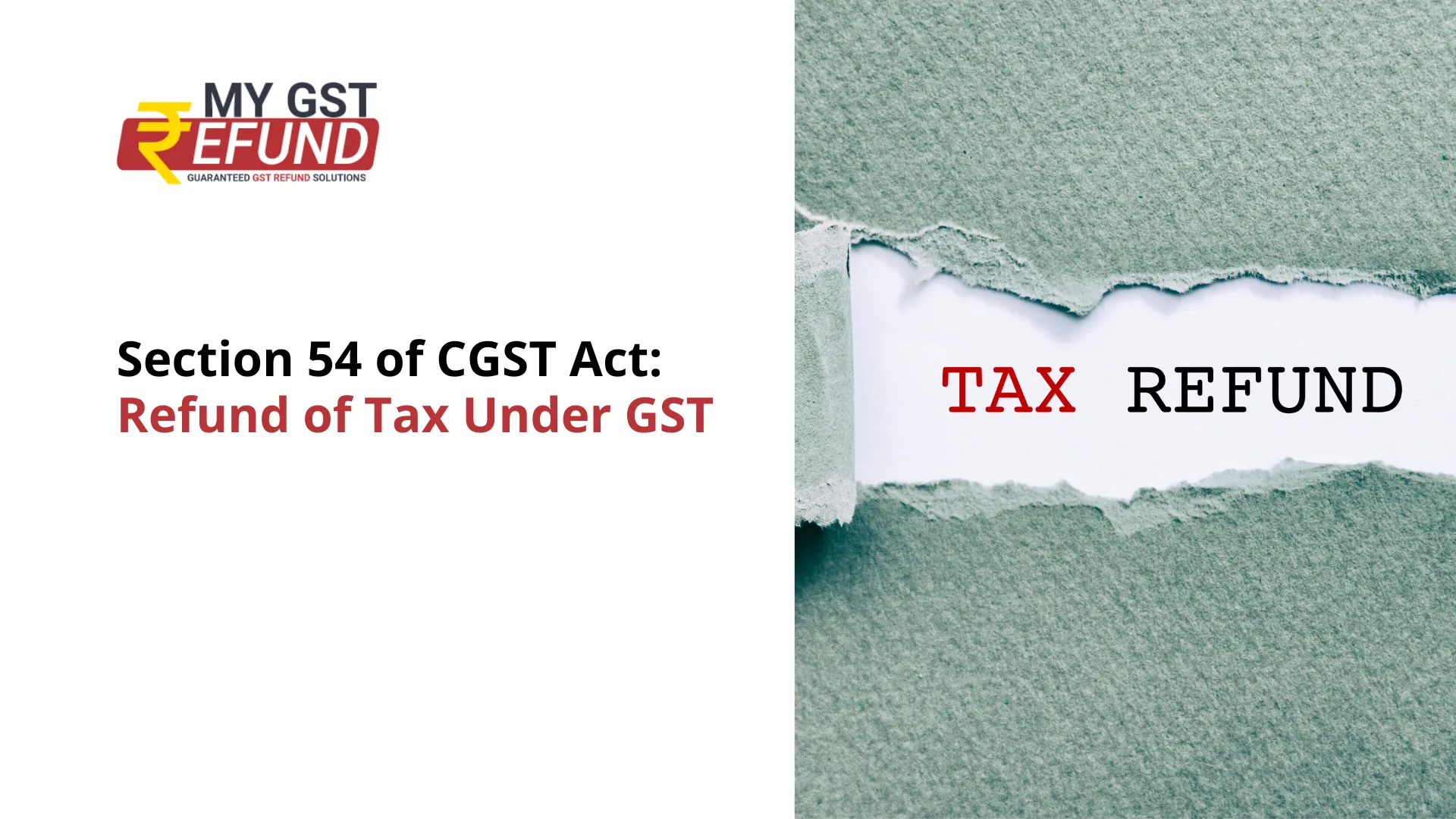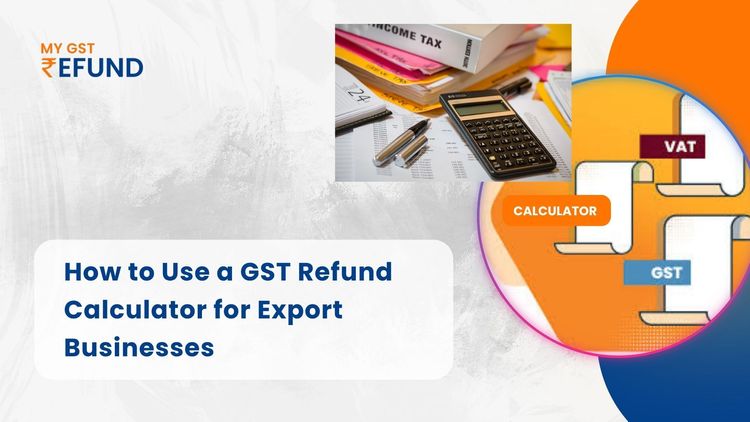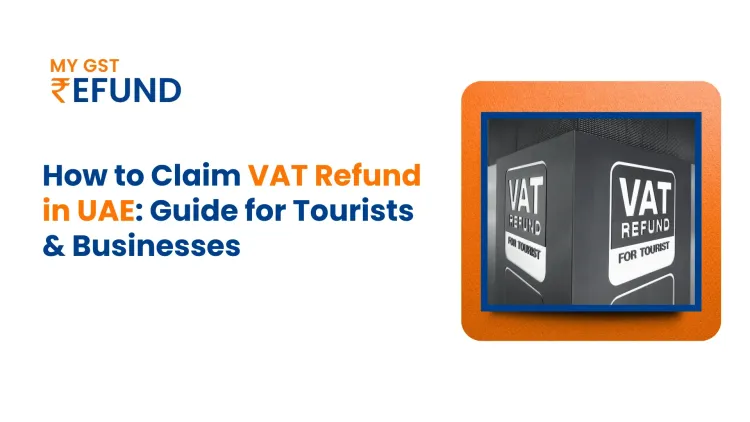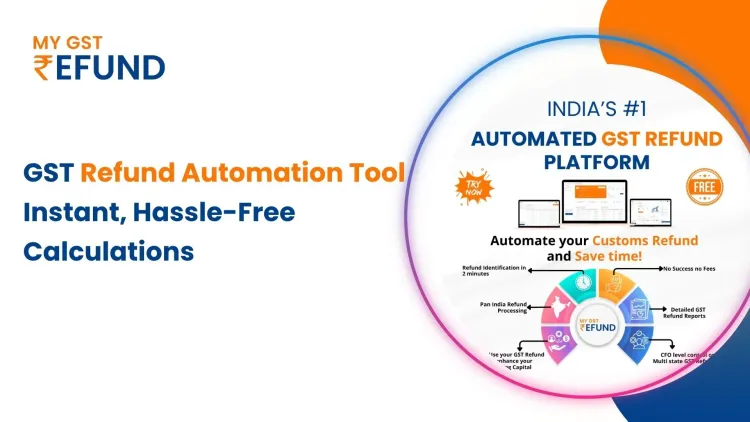Section 54 of the CGST Act 2017 is deals with the refunds for exporters, SEZ suppliers, sellers on e-commerce platforms etc. Refunds can be claimed for taxes paid on exportation of goods or services, zero rated supplies, presumed exports and unused input tax credits (ITC) in exporting under LUT. Refunds on taxes paid during exportation assist in boosting exports thus making Indian goods as well as services competitive internationally. Similarly also refunds on zero rated supplies are aimed at making such supplies more attractive to Special Economic Zones (SEZs) developers or units. Nevertheless, several conditions including the necessity to present evidence; restriction to deadlines within which refund requests should be filed and observance of conditions for verification and approval are set out in this Section 54.Such requirements must thus be adhered to by the taxpayer if he/she is seeking a refund through this section.
Section 54(1) of the CGST Act
An application for GST refund should be made within a span of two years from the applicable date, which is determined by the reason for making such claims. The application shall be in prescribed format and must comply with the laid down procedures. Also note that, in case of registered persons applying for refund of any remaining sum standing in their electronic cash ledgers, such claims must be made under form and mode prescribed under Section 49(6) that makes this type of refund exempt from any time limits.
As per Section 54(2) of the CGST Act
They are entitled to a refund of tax paid on goods and services to specialized agencies, such as a multi-lateral financial institution, the United Nations or any other group named in Section 55. However, they must apply for such refunds within two years from the end of the quarter during which those supplies were made.
Section 54(3) of CGST Act
At the end of tax period, any registered person may file for refund of unutilized input tax credits, subject to the conditions set out under subsection (10); this is permitted only in the following cases:
- Zero-rated supplies made without payment of tax.
Where ITC is accumulated on account of the inverted duty structure, where the rate of tax on inputs is higher than the rate of tax on outputs.
Refunds of unutilized ITC are not allowed in the following cases:
Where goods are exported out of India, they are subject to export duty.
If the supplier avails of the drawback of central tax or claims a refund of integrated tax paid.
Section 54(4) of the CGST Act
- The application for a refund must include:
Any necessary documents that prove entitlement to the refund, and Evidence showing that the tax and interest, if any, paid on the tax or other amount were paid by the applicant and not passed on to someone else. This includes documents listed in Section 33.
However, if the refund amount is less than two lakh rupees, the applicant can submit a declaration stating, based on the available evidence, that the tax and interest were not passed on to another person.
Section 54(5) of the CGST Act
Thereafter, the authorized officer will examine the refund application. If verified by the officer that the requested refund amount is true then 50 percent or 100 percent shall be credited into this fund as provided in Section 57.
Section 54(6) of the CGST Act
In cases where registered persons claim refunds based on goods or services supplied at zero rates, a proper officer may provisionally refund 90 percent of the claimed amount.
Section 54(7) of the CGST Act
The proper officer shall issue an order within 60 days from the date of receipt of the application.
Section 54(8) of the CGST Act
Even if subsection (5) says otherwise, the refundable amount will be paid directly to the applicant instead of being put into the fund if it relates to:
- A refund of taxes paid on exports, including products, services, or both, and on the inputs or services used to make these exports.
- refunds for input tax credits as mentioned in subsection (3).
- A refund of tax for a supply that was never made, either fully or partially, if no invoice was issued or a refund voucher was given.
- A tax refund according to Section 77.
- If the applicant didn’t pass on the tax and interest costs to someone else, they will get back the tax, any interest, or other amounts they paid.
Explanation: Refunds may sometimes be given directly to the applicant instead of going into the Consumer Welfare Fund if:
- The refund is for taxes on exports or the materials used to make those exports.
- The refund is for unused input tax credits, as described in subsection (3).
- The refund is for taxes paid on goods and services that were not delivered, not invoiced, or where a refund voucher was issued.
- The refund is for taxes paid by mistake, as outlined in Section 77 of the CGST Act, 2017, which deals with refunds for tax wrongly collected.
- The refund is for taxes or interest paid by the applicant themselves.
- The refund is for taxes or interest paid by a specific group of applicants defined by the government.
Section 54 (8A) of the CGST Act
The state tax refund may be paid out by the government in the way that may be prescribed.
Explanation: The government shall pay the refund on state tax in the manner as may be prescribed.
Section 54(9) of the CGST Act
No refund will be given unless it follows the rules set out in subsection (8), even if there is a different ruling from the Appellate Tribunal, any court, other parts of this Act, its rules, or any other law in force.
Explanation: An applicant can only apply for a refund if they follow the rules in subsection (8), even if there is a court judgment or order that says otherwise .
Section 54(10) of the CGST Act
If a registered person is entitled to a refund and has not submitted their return or paid their taxes, interest or penalties, and a court or authority has not stayed these obligations, the officer in charge may:
- Retain the refund until the person submits their return or pays the taxes, interest, or penalty due;
- Deduct from the refund any taxes, interest, penalties and charges still owed by the said person under this act and other laws.
Explanation: If the taxpayer has not lodged his return by deadline he can be denied refund until he does so or pay his outstanding tax as well as additional interest if applicable even if it was not stayed. The same rule applies to tax returns which have not been submitted other than those already frozen according to rules set by courts of law. The official will subtract from this amount anything he owes including unpaid taxes, interests accrued on late remittances and any other amounts he has not yet paid into state coffers as required by this act. The last day for filing an appeal according to the Act is the date mentioned above.
Section 54(11) of the CGST Act
In case of any appeal or similar litigation concerning the refund, the Commissioner may defer the refund after affording a hearing opportunity to the taxpayer. If it appears to him that there is a possibility that non consideration of his advice meant for withholding such refund will impact on revenue through suspected misappropriation or fraud, such refund shall not be disbursed at least until after he has taken his decision.
Explanation: If he suspects that grant of money would lead loss in revenue through theft or mismanagement then he should choose to freeze that payment if there is an appeal going on or any other court action. Before this step is undertaken, however, the taxpayer must have been given an opportunity to present their case before others involved in this case.
Section 54(12) of the CGST Act
If a refund is kept back as per subsection (11), and eventually the taxpayer is found entitled to it after an appeal or any further proceedings, they shall receive interest @ 6% on the refund. The rate of interest will not exceed the six percent which is prescribed by the recommendations of the Council.
Explanation: According to this subsection, if Commissioner has withheld a refund according to subsection 11 then that person would be entitled for interest on such refund. It would not be more than six percent and it would be fixed as per recommendations of the Council.
Section 54(13) of the CGST Act
Even if other rules in this section say otherwise, a non-resident or casual taxpayer cannot get a refund of the advance tax they paid unless they have submitted all the required returns for the entire period.
Section 54(14) of the CGST Act
No one will get a refund under subsections (5) or (6) if the amount is less than one thousand rupees, even if other rules in this section suggest otherwise.
Explanation: An applicant won’t get a refund under subsections (5) or (6) if the amount is less than Rs. 1,000.
What are the refund types included and excluded in this section?
Section 54 of the CGST Act, 2017 covers refunds for tax paid on goods or services in certain cases. Here’s a breakdown of what refunds can and cannot be claimed under this section:
Refunds that can be claimed:
- Taxes paid on goods or services that are exported.
- Taxes paid on supplies to a Special Economic Zone (SEZ) developer or unit, or for the authorized operations of an offshore banking unit.
Taxes paid on deemed exports. - Refunds for unused input tax credit (ITC) in cases of export and inverted duty structure
- Refund of excess balance in cash ledger
- Refunds for taxes paid by mistake under Section 77.
Refunds that cannot be claimed:
- Taxes paid on supplies not covered by the CGST Act, such as alcohol for human consumption.
- If export duty is charged on goods exported from India
- If the supplier has already claimed a duty drawback or IGST refund on the goods.
Documents needed for claiming GST refund
The documents needed for claiming GST refund under Section 54 of the CGST Act, 2017 can vary based on the type of refund being claimed. Some common documents include:
- GSTR-1, GSTR3B, and GSTR2B
- Sales register
- Input tax register
- Purchase and sales tax invoices
- Shipping bills and export invoices
- Bill of entry
- Any other document requested by the official in charge
Conclusion
Section 54 of the CGST Act explains how registered people can claim refunds for any excess GST they have paid. It details the conditions and deadlines for making these claims and specifies the dates used to determine eligibility for refunds.
Taxpayers can get refunds for taxes paid on inputs, input services, and capital goods used for business, as well as for exports and zero-rated supplies. To ensure a smooth refund process and avoid penalties or legal problems, it’s important to follow the rules and procedures outlined in Section 54.
Also Read :Section 16 - Eligibility and conditions for taking input tax credit
Related Posts









